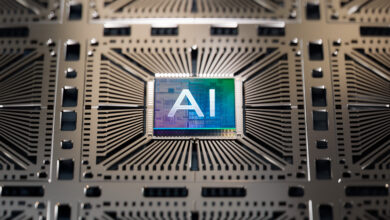3 Millionaire-Maker Artificial Intelligence (AI) Stocks

The newest industry within the technology sector offers incredible potential gains for investors that can pick the best-positioned companies.
It’s reasonably safe to say at this point that artificial intelligence is here to stay, joining a handful of other modern-era technological evolutions like smartphones and the internet. Unlike those other inventions, however, the AI industry is still in its infancy. Most of its growth is still in the future, presenting an opportunity for investors looking to capitalize on its growth.
With that as the backdrop, here’s a rundown of three stocks uniquely positioned to benefit from the ongoing rise of artificial intelligence.
1. C3.ai
Most corporate leaders know that artificial intelligence exists, and that it could potentially benefit their business. What most of this leadership still doesn’t quite understand, however, is exactly how AI could be used to make their company better; somehow employees and customers being able to talk with a custom-built chatbot doesn’t seem game-changing.
Enter C3.ai (AI -0.72%).
In the simplest terms, C3ai offers AI-powered solutions that solve real-world problems. It’s got more than 40 different problem-specific artificial intelligence apps in its portfolio, capable of handling tasks like predicting when the U.S. Air Force’s planes will need maintenance, assisting utility companies in managing their smart meters, and even helping tax authorities figure out appropriate valuations for local real estate. If there’s a complex need, C3.ai probably already has an off-the-shelf product ready to go. And if it doesn’t have one, it can create one.
And the market is most definitely responding to these offerings. The current fiscal year’s top line is on pace to grow nearly 16% before accelerating to a pace of more than 19% next fiscal year. Looking down the road, Precedence Research believes the artificial intelligence software market is likely to grow at an annualized pace of 23% through 2032, with most of that growth taking shape during the latter half of the forecast period. C3ai is well positioned to capture more of the industry’s impending expansion.
The company isn’t profitable — at least not yet — perhaps undermining the stock’s performance since making its post-IPO peak in late 2020. Don’t sweat that too much though. C3.ai is making clear progress toward profitability, with analysts expecting it to be in the black by 2027. The stock could start to perform well before then, however, as the promise of profitability firms up.
2. Microsoft
It wouldn’t be accurate to say Microsoft (MSFT -1.27%) has been conspicuously absent from the advent of artificial intelligence. But it wouldn’t be unfair to say the company’s not been at the heart of it, either. The software giant’s simply remained focused on its strengths, which are cloud computing, productivity software, and its Windows operating system.
That being said, don’t be surprised to see Microsoft become a much more serious AI player in the near future.
One of its latest pushes deeper into the artificial intelligence arena is an updated version of its cloud management software Azure. Since the beginning of this year the company has bolstered the AI-minded capabilities of this platform, like a feature reducing the inherent risk of mistakes — called hallucinations — when using the (very) large language models that most artificial intelligence-powered chat-based platforms utilize. This, of course, will boost the dependability of AI chatbots like OpenAI’s ChatGPT, which is now integrated into Microsoft’s search engine Bing.
And that’s hardly where ChatGPT ends for Microsoft. This particular artificial intelligence assistant is also the tech behind Microsoft’s revenue-producing Copilot Pro, which is aimed at enterprise users of its productivity software.
The company’s also custom-building chips for enterprise customers that want to get the most AI functionality out of their Azure-managed systems. The new Azure Maia AI chip and the Azure Cobalt processor are high-performance and cost-effective enough to compete with Nvidia, which to date has dominated the artificial intelligence hardware market.
Perhaps the most exciting AI opportunity Microsoft is finally addressing, however, is the development of a computer processor custom-built to handle artificial intelligence workloads. Using Qualcomm‘s Snapdragon X Elite processors as the technological foundation, Microsoft recently unveiled laptops that can handle generative AI duties at the computer itself rather than in the cloud, where such tasks are usually completed now.
It’s not entirely clear what Microsoft’s artificial intelligence business will look like five, 10, or 15 years down the road. What is clear is that the company is positioning for whatever the future may hold, leveraging its existing reach within other slivers of the technology market.
3. IonQ
Last but not least, add IonQ (IONQ -3.80%) to your list of potential millionaire-maker artificial intelligence stocks.
It’s not a household name, and it may never be. IonQ is still at the cutting edge of a game-changing technological revolution though. That’s quantum computing, which is a whole new kind of computing paradigm. Rather than sending and receiving digital ones and zeroes through silicon, quantum computers (literally) use subatomic particles like photons and electrons to handle complex calculations. These superfast powerful systems would be of no value to an ordinary individual looking to surf the web or play a video game. For the data-intense work demanded by artificial intelligence applications, though, this approach is far more promising than even today’s best AI platforms.
And it’s important to understand that IonQ isn’t merely tinkering with the idea — it’s already built and even monetized quantum computers, collecting $22 million worth of revenue last year in exchange for time-based access to its tech, as well as outright sales of its systems. That’s twice the previous year’s top line, and it’s pushed higher by a combination of bringing more systems to market and a growing understanding of how quantum computing solutions can be utilized.
This year’s sales are projected to grow another 77% before acerating to a growth pace of 110% next year, as interest in this tech continues to swell and more IonQ-made systems are brought online.
It’s admittedly the riskiest stock of the three AI stocks in focus here. This is a relatively new technology after all, and not exactly well proven in a real-world setting. IonQ is also still operating in the red, and will likely remain in the red for at least a couple more years.
Given Precedence Research’s expectation that the quantum computing market will grow at an average annualized pace of nearly 37% through 2030, though, the potential reward arguably justifies this risk.



